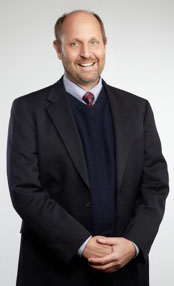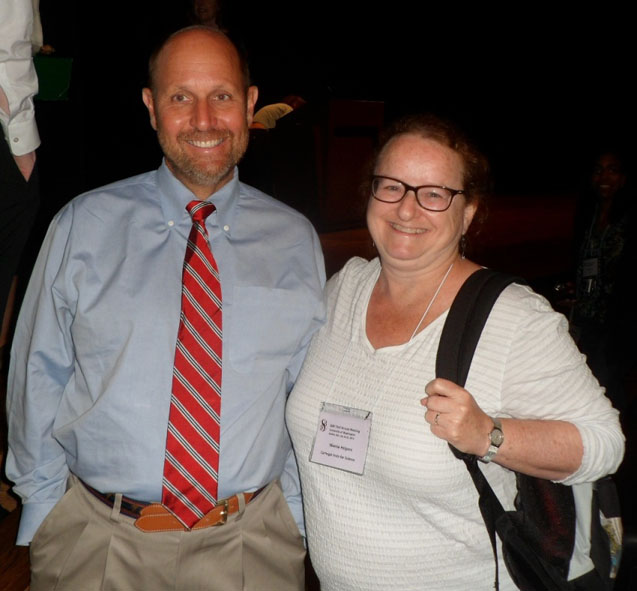Larry Bock Awarded Hamburger
Outstanding Educator Prize
By Marsha E. Lucas
 The
2014
Viktor Hamburger Outstanding Educator Prize was
awarded to
Larry Bock, founder of the
USA
Science & Engineering Festival (USASEF). This
award recognizes individuals who have made
outstanding contributions to education in
developmental biology and related areas. Bock
achieved this through his organization of the of
largest celebration of science in the United States.
Some 325,000 attendees visited the USASEF in
Washington, DC this past April where some 1100
organizations created interactive science and
engineering exhibits for people of all ages. The
Society for Developmental Biology has actively
participated in this biennial festival since its
inception in 2010. The
2014
Viktor Hamburger Outstanding Educator Prize was
awarded to
Larry Bock, founder of the
USA
Science & Engineering Festival (USASEF). This
award recognizes individuals who have made
outstanding contributions to education in
developmental biology and related areas. Bock
achieved this through his organization of the of
largest celebration of science in the United States.
Some 325,000 attendees visited the USASEF in
Washington, DC this past April where some 1100
organizations created interactive science and
engineering exhibits for people of all ages. The
Society for Developmental Biology has actively
participated in this biennial festival since its
inception in 2010.
In an interview in
June, Bock described how this festival came about.
“I spent most of my
career as a high-tech entrepreneur, started about
forty high-tech or life science companies worth
about 70 billion dollars, and then called it quits
in early 2002. [I] took my family abroad for fun and
it was in that context that I bumped into these
international science festivals and I thought they
were such a great idea that I came back to the
States sort of invigorated to create my own,” he
said.
“The reason I
thought they were a great idea is I could not
recruit Americans to the advanced science positions
of the companies I was starting up—not because I
didn’t want to, but because they weren’t going into
those fields.”
You get what you
celebrate. Those words by Segway inventor,
Dean Kamen, resonated with Bock.
“We celebrate
athletes and pop stars and actors and actresses, but
we don’t celebrate scientists and engineers. So it
was sort of my goal to put on the largest
celebration of science and engineering.”
Bock earned his
bachelor’s in biochemistry from Bowdoin College in
1981. He started out as a researcher at Genentech
and then in 1985 earned an MBA from the University
of California, Los Angeles. This was the beginning
of his career as a “serial entrepreneur” in which he
invested in and founded dozens of biotech companies
including the gene sequencing and microarray company
Illumina.
In 2008 Bock founded
the non-profit Science Spark to “create the most
compelling science festivals around the country.”
The first San Diego Science Festival was held in
2009.
“The night before
[the festival] I called up all my friends and said,
‘Look, can you come down to Balboa Park where the
Expo is and in case there’s no one standing in front
of a booth, could you just go up there, so I’m not
embarrassed?’”
His concerns turned
out to be unwarranted.
“Very shortly after
[10 am] there was literally an eight-mile back-up on
the 163 Freeway coming to Balboa Park,” Bock said.
“I didn’t fully
comprehend how much underlying want there was by the
public for a science event,” he said. Being able to
fill this void has been one of the most rewarding
parts of doing this festival.
Following the
success of the San Diego Science Festival, the chief
technology officer of Lockheed Martin—its lead
sponsor—contacted Bock.
“Ray
O. Johnson called me up and said, ‘That was fun,
but really this should be a national event. We
should do it in Washington, DC.’ And I ...very
stupidly said, ‘Yeah, but Washington, DC is not a
science city. It really wouldn’t work there.’
In fact,
“[Washington, DC] ended up really being an ideal
place to do it,” he said. This was due in part to
the large number of scientific societies, government
agencies and national labs that have offices in the
Washington, DC area.
The first USA
Science & Engineering Festival was held on the
National Mall in October 2010 and drew about 500,000
people. Subsequent festivals have been held at the
convention center where weather is not a factor and
microscopes can’t be damaged by flying dust.
|
 |
|
Bock
with Halpern following the 2014 SDB
Awards Lectures. |
Bock said people get
interested in science because of teachers, parents,
role models, and sometimes an event. The USASEF hits
upon all those things.
“We have a Nifty
Fifty Program where we bring scientists and
engineers into schools and we’re trying to create a
current set of new role models.” SDB member,
Marnie Halpern, from the Carnegie Institution
for Science participated in this program all three
years.
In 2016, the USASEF
will have a day specifically for teachers to visit
the expo and get resources, he said. Finally, the
expo itself is a family event.
“Your organization [SDB]
I think sort of expressed this to me one time [that]
this event is not only for the attendee, but it’s
also for the exhibitor. The number of times I get a
comment along the lines of ‘Hey, kids stood in line
for an hour to do the activity at my booth and all
of a sudden my kids thought what I was doing was
really important.’”
Even big
corporations like Lockheed don’t sponsor events like
this just for philanthropic reasons or to get their
name out there, he said. It’s to “have their
employees involved in something that they feel is
meaningful.”
Bock donated his
$2000 Viktor Hamburger Outstanding Educator Prize
money to the USASEF in SDB’s name. The Society will
be recognized as a Titanium Level Sponsor for the
2016 Festival.
|